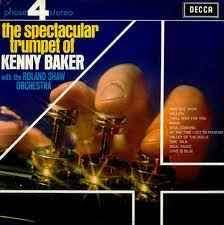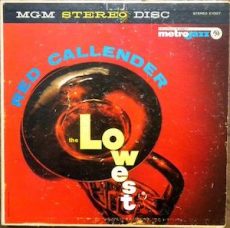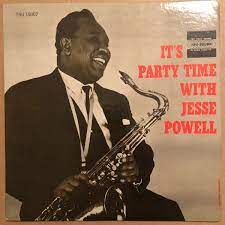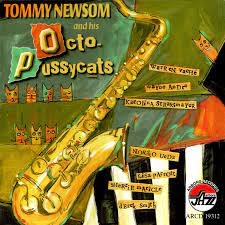
Daily Dose Of Jazz…
Kenny Baker was born on March 1, 1921 in Withernsea, East Riding of Yorkshire, England. Joining a brass band, by the age of 17 he had already become a professional musician. After leaving his home town for London, he met and began performing with George Chisholm. He was first heard on record in a British public jam session in 1941 and quickly established a strong reputation in London clubs.
After serving in the Royal Air Force during WWII, the young Baker was lead trumpeter with Ted Heath’s post war orchestra, with Bakerloo Non-Stop recorded for the Decca record label in 1946. He played a tenor saxophone solo on Johnny Gray, the piece recorded by both Baker and the drummer Jack Parnell. During the 1950s, he led his own group called Baker’s Dozen and performed on the first regular jazz show, the BBC Light Programme series Let’s Settle For Music.
During this period he regularly recorded as a quartet for Parlophone, and in the Sixties and Seventies, he was on call for film and studio work. He shared top billing with comedy variety acts, continued to appear on BBC shows, and formed the Best of British Jazz show with Don Lusher and Betty Smith. He went on to play with Frank Sinatra, Petula Clark, Sammy Davis, Jr. and Tony Bennett, as well as performing on James Bond soundtracks, with The Beatles and The Muppet Show among numerous other television shows.
Trumpeter, cornetist, flugelhornist and composer Kenny Baker, who was titled three times as best trumpet player and awarded the MBE title, died in Felpham, West Sussex on December 7, 1999 after suffering from a viral infection. He was 78.
More Posts: bandleader,composer,cornet,flugelhorn,history,instrumental,jazz,music,trumpet

Daily Dose Of Jazz…
William Douglass was born on February 28, 1923 in Sherman, Texas. His extended family relocated to Los Angeles, California when he was six months old in an effort to escape Jim Crow laws. As a member of a musical family he took an early interest in music and when he heard drummer Gene Krupa performing Sing, Sing, Sing on the radio his path was set. He met and befriended Dexter Gordon while attending McKinley Junior High School in Los Angeles, at which point he first began playing drums.
At Jefferson High School, both he and Gordon began taking band under teacher Lloyd Reese, and took private keyboard instructions. Never taking private drum lessons, Bill eventually made the acquaintance of drummer Cozy Cole, who allowed him to watch him practice. What he learned by watching him and other drummers helped him evolve a style of his own.
While still in schoo he, Dexter and Lammar Wright, Jr. he began playing in Central Avenue night clubs. Eventually he began drumming for pianist Gerald Wiggins, along with double bass and tuba player Red Callender, until he and Callender left to form a trio with blind pianist Art Tatum.
In 1941 upon graduating from high school he enlisted in the United States Army and was assigned to the Black 10th Cavalry Regiment at Camp Lockett. This led to his start to seeing the world being stationed in Casablanca, Oran, Algiers, Naples and Rome. During these travels, Bill became drum major of his 28-piece ensemble, a position he attributed to his great height.
Leaving the service he went on to a stint with Benny Goodman, where he was at the time the only black member of the band. Bill eventually became part of the union struggle for integration and equality. Even as a working musician, Douglass expanded into teaching drums at Drum City. Among his students, were Ray Brown, Jr., Karen Carpenter, and Ella Fitzgerald.
Drummer and educator Bill Douglass, who was an active proponent of desegregation in the American Federation of Musicians, died on December 19, 1994.
More Posts: bandleader,drums,history,instrumental,jazz,music

Daily Dose Of Jazz…
Jesse Powell was born in Smithville, Bastrop County, Texas, on February 27, 1924. He received his formal music training before he began his professional career at age eighteen, when he toured with fellow Texan, Oran “Hot Lips” Page beginning at the age of eighteen during 1942–43.
During the war years he went on to play with Louis Armstrong in 1943–44, then with the Luis Russell Orchestra in 1944–45. He replaced fellow Texas tenorist Illinois Jacquet in the Count Basie Band for a tour of California in 1946. At this time Powell also worked with blues singers Champion Jack Dupree and Brownie McGhee.
1947 saw Jesse joining Curly Russell’s band, and in 1948 he formed his own band in New York City. That same year he performed with trumpeter Howard McGhee at the first international jazz festival in Paris. In 1949–50, he was a member of the Dizzy Gillespie Big Band, with whom he recorded a solo on Tally Ho. In 1953 he once again formed another jump-rhythm band, and in 1964 a Powell quintet played at Birdland in New York City.
Tenor saxophonist Jesse Powell died on October 19, 1982 in New York City.
More Posts: bandleader,history,instrumental,jazz,music,saxophone

Daily Dose Of Jazz…
Thomas Penn Newsom was born in Portsmouth, Virginia on February 25, 1929 and earned degrees from the Norfolk Division of the College of William & Mary, the Peabody Conservatory of Music, and Columbia University. He went on to serve in the United States Air Force during the Korean War where he played in the band.
He toured with the Benny Goodman Orchestra and performed with Vincent Lopez in New York. Newsom joined the Tonight Show Band in 1962, and left it when Carson retired in 1992. In addition to Carson’s orchestra, he performed with the orchestra for The Merv Griffin Show.
Well known within the music industry as an arranger as well as a performer, he arranged for groups as varied as the Tonight Show ensemble and the Cincinnati Pops Orchestra, and musicians Skitch Henderson, Woody Herman, Kenny Rogers, Charlie Byrd, John Denver, and opera star Beverly Sills.
He won two Emmy Awards as a music director, one in 1982 with Night of 100 Stars, and in 1986 for the broadcast of the 40th Annual Tony Awards. He also recorded six albums as a bandleader and another four as a sideman.
On April 28, 2007 saxophonist Tommy Newsom, who was nicknamed Mr. Excitement by Johnny Carson and was the band’s substitute director, died of bladder and liver cancer at his home in Portsmouth. He was 78 years old.
More Posts: arranger,bandleader,history,instrumental,jazz,music,music director,saxophone

Jazz Poems
WALKING PARKER HOME
Sweet beats of jazz impaled on slivers of wind Kansas Black Morning/First Horn Eyes/ Historical sound pictures on New Bird wings People shouts/ boy alto dreams/ Tomorrow’s Gold belled pipe of stops and future Blues Times Lurking Hawkins/ shadows of Lester/ realization Bronzer fingers–brain extensions seeking trapped sounds Ghetto thoughts/ bandstand courage/ solo flight Nerve-wracked suspicions of never songs and doubts New York altar city/ black tears/ secret disciples Hammer horn pounding soul markson unswinging gates Cultural gods/ mob sounds/ visions of spikes Panic excursions to tribal Jazz wombs and transfusions Heroin nights of birth/ and soaring/ over boppy new ground Smothered rage covering pyramids of notes spontaneously exploding Cool revelations/ shrill hopes/beauty speared into greedy ears Birdland nights on bop mountains, windy saxophone revolutions. Dayrooms of junk/ and melting walls and circling vultures/ Money cancer/ remembered pain/ terror flights/ Death and indestructible existence In that Jazz corner of life Wrapped in a mist of sound His legacy, our Jazz-tinted dawn Wailing his triumphs of oddly begotten dreams Inviting the nerveless to feel once more That fierce dying of humans consumed In raging fires of Love.
BOB KAUFMAN
from Jazz Poems ~ Selected and Edited by Kevin Young
More Posts: book,classic,collectible,history,jazz,library,poet




